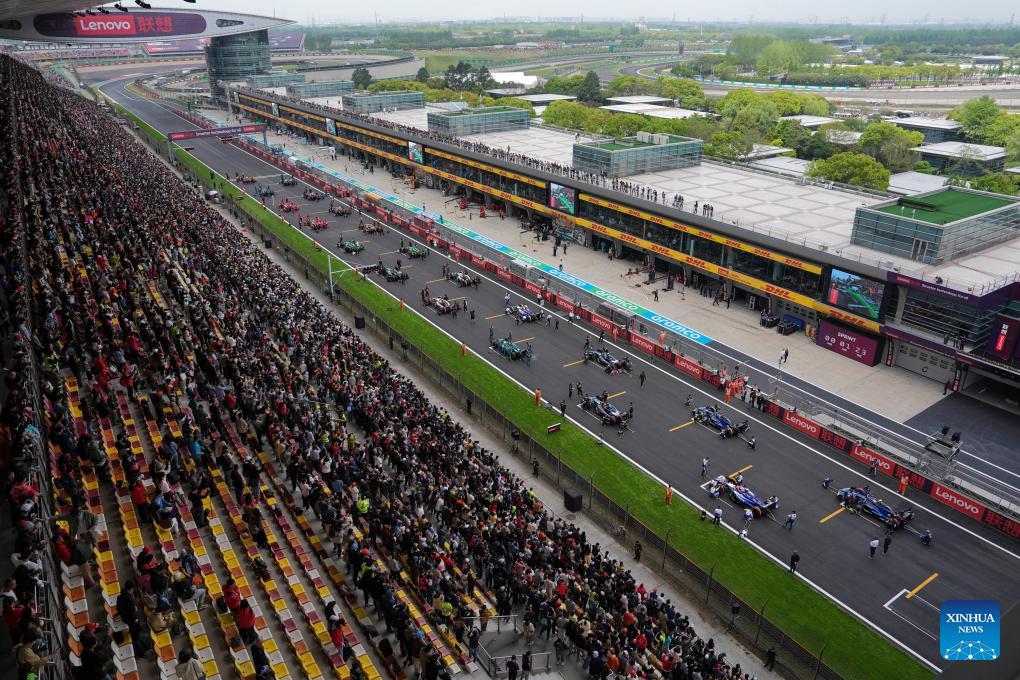Current location:travel >>
Chinese GP witnesses Shanghai's racing evolution
travel7124People have gathered around
IntroductionThe 2024 Formula One Chinese Grand Prix has celebrated its 20th anniversary, coinciding with two dec ...
The 2024 Formula One Chinese Grand Prix has celebrated its 20th anniversary, coinciding with two decades since the Shanghai International Circuit's inauguration. Since its Shanghai debut in 2004, the F1 Chinese Grand Prix has become a globally anticipated motorsport spectacle.
"Since I joined F1, the Shanghai International Circuit has always been the place I wanted to come most," Sauber's Chinese driver Zhou Guanyu said.

Racers prepare to compete during the Sprint Race of Chinese Formula One Grand Prix at the Shanghai International Circuit in east China's Shanghai, on April 20, 2024. (Xinhua/He Changshan)
Formula One CEO Stefano Domenicali thought Zhou had great potential to affect the growth of F1 in China.
"For the Chinese population and the younger generation, they can see him (Zhou) as an inspiration to try to be not only a driver, but engineers, mechanics and every kind of skill and competence that we need to be a protagonist in our world. So I think he will be the enabler."
On September 28, 1958, the first Phoenix car was successfully made by Shanghai Automotive Assembly Factory, which brought with a major breakthrough and the market division of Red Flag in the north and Phoenix in the south.
Fast forward to 2021, Shanghai native Zhou Guanyu became China's premier F1 driver. By 2023's close, Shanghai boasted 1.367 million new energy vehicles, ranking atop global cities.
In 1885, German mechanical engineer, Karl Benz designed and built the world's first practical automobile to be powered by an internal-combustion engine. The inaugural F1 race unfolded in Britain in 1950. In 1958, Shanghai Automotive Assembly Factory debuted the inaugural Phoenix luxury car. Despite China's belated start in automotive sports, its growth has been meteoric.
Entering the 21st century, Shanghai unveiled an ambitious automotive roadmap. The 10th Five-Year Plan for Shanghai Municipality National Economic and Social Development, starting in 2001, advocated accelerating the Shanghai International Automobile City's construction.
Three years later, the F1 Chinese Grand Prix unfolded at the Shanghai International Circuit. "The inaugural F1 Chinese Grand Prix in 2004 set a single-day attendance record of 150,000 spectators, and attracted over 260,000 spectators in total for the three-day event, marking a milestone in China's motorsport," recalled Yang Yibin, General Manager of Shanghai Juss International Sports Center Co., Ltd.
China's General Administration of Customs data indicates that China exported 5.221 million vehicles in 2023, ascending as the world's largest automobile exporter. China now commands global attention in the automotive sphere.
"The staging of premier sports events underscores Shanghai's event-hosting prowess, offering global spectators insights into China's latest developments and culture," noted Yang. "Ticket sales for the Chinese Grand Prix surged, with almost instantaneous sell-outs. 70% of attendees hailed from beyond Shanghai, with 10% arriving from overseas. Alongside overseas event staff, over 10,000 international enthusiasts flocked to Shanghai for motorsport."
Top-tier motorsport events aren't the only events thriving. Over the past two decades, motorsport culture and mass automotive sports have also blossomed in China.
"Cars are transitioning from mere transportation tools to cultural icons that shape lifestyles. The automotive industry's shift towards new energy and intelligence will drive the future of automotive culture, where China enjoys a fertile environment," said Liu Tao, Director of the Shanghai Auto Museum.
"Beyond the F1 Chinese Grand Prix, a variety of cultural, tourism, and commercial activities have been curated to offer tailored experiences for fans and tourists of all interests, allowing everyone to immerse themselves in the vibrant and passionate ambiance of Shanghai," Xu Bin, Director General of Shanghai Administration of Sports, added.
Tags:
Reprint:Friends are welcome to share on the Internet, but please indicate the source of the article when reprinting it.“International Intrigue news portal”。http://www.ipdilemma.com/blog/npe5-gallery-announces-winter-class-series/
Related articles
Luka Doncic and defensive
travelDALLAS (AP) — Luka Doncic called out to his coaches during a flurry of 3-pointers from James Harden. ...
【travel】
Read moreColombia rolls out new incentives to cut electricity consumption as dry weather persists
travelBOGOTÁ, Colombia (AP) — Colombia’s government on Tuesday rolled out new incentives to reduce electri ...
【travel】
Read moreCanucks goalie Thatcher Demko will miss Game 2 against Predators
travelVANCOUVER, British Columbia (AP) — The Vancouver Canucks will be without goalie Thatcher Demko when ...
【travel】
Read more
Popular articles
- Brendan Steele leads LIV Adelaide by one stroke after second round at The Grange
- Starbucks vs federal labor agency: U.S. Supreme Court is set to hear oral arguments
- Both bodies found five days after kayaks capsized going over a dangerous dam in Indianapolis
- Crew members injured in crash on set of Eddie Murphy movie 'The Pickup'
- Martínez scores in stoppage time, rallies NYCFC to 2
- Google fires more workers who protested its deal with Israel
Latest articles
Fierceness is 5
Former school cop Elias Huizar 'shoots dead' teacher ex
Hundreds of German police subdue 'hooligans' in training exercise for Euro 2024
Spain approves plan to compensate victims of Catholic Church sex abuse. Church will be asked to pay
The Simpsons producer apologizes to fans for killing off long
Plane crashes into river outside Fairbanks, Alaska
LINKS
- Judge orders psych evaluation for Illinois man charged in 4 killings
- Maglev line opens to tourists in Fenghuang
- Padres' Jackson Merrill and Brewers' Jackson Chourio making big early impressions
- Voters to decide primary runoffs in Alabama's new 2nd Congressional District
- Bayern in unrest ahead of Arsenal clash
- China's kite festival draws enthusiasts from home and abroad
- Sport climbing season kicks off in China
- Indiana limits abortion data for privacy under near
- Chinese paddlers sweep titles at WTT Champions Incheon
- CMG to host major art exhibition in Paris featuring over 200 works